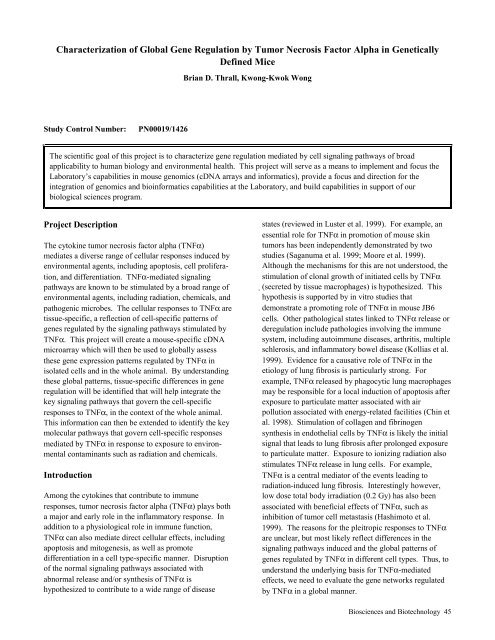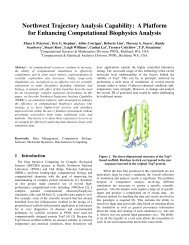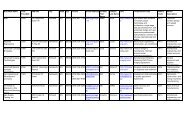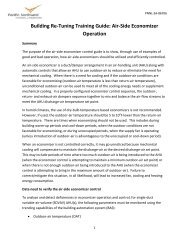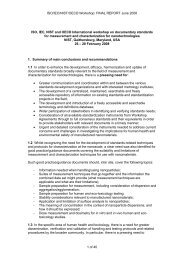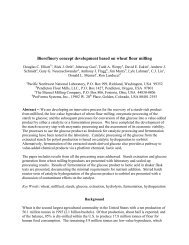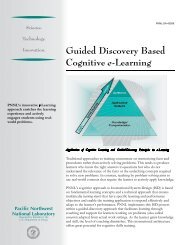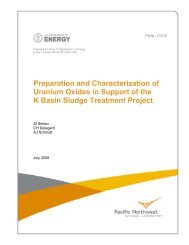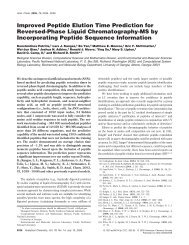PNNL-13501 - Pacific Northwest National Laboratory
PNNL-13501 - Pacific Northwest National Laboratory
PNNL-13501 - Pacific Northwest National Laboratory
You also want an ePaper? Increase the reach of your titles
YUMPU automatically turns print PDFs into web optimized ePapers that Google loves.
Characterization of Global Gene Regulation by Tumor Necrosis Factor Alpha in Genetically<br />
Defined Mice<br />
Study Control Number: PN00019/1426<br />
Brian D. Thrall, Kwong-Kwok Wong<br />
The scientific goal of this project is to characterize gene regulation mediated by cell signaling pathways of broad<br />
applicability to human biology and environmental health. This project will serve as a means to implement and focus the<br />
<strong>Laboratory</strong>’s capabilities in mouse genomics (cDNA arrays and informatics), provide a focus and direction for the<br />
integration of genomics and bioinformatics capabilities at the <strong>Laboratory</strong>, and build capabilities in support of our<br />
biological sciences program.<br />
Project Description<br />
The cytokine tumor necrosis factor alpha (TNFα)<br />
mediates a diverse range of cellular responses induced by<br />
environmental agents, including apoptosis, cell proliferation,<br />
and differentiation. TNFα-mediated signaling<br />
pathways are known to be stimulated by a broad range of<br />
environmental agents, including radiation, chemicals, and<br />
pathogenic microbes. The cellular responses to TNFα are<br />
tissue-specific, a reflection of cell-specific patterns of<br />
genes regulated by the signaling pathways stimulated by<br />
TNFα. This project will create a mouse-specific cDNA<br />
microarray which will then be used to globally assess<br />
these gene expression patterns regulated by TNFα in<br />
isolated cells and in the whole animal. By understanding<br />
these global patterns, tissue-specific differences in gene<br />
regulation will be identified that will help integrate the<br />
key signaling pathways that govern the cell-specific<br />
responses to TNFα, in the context of the whole animal.<br />
This information can then be extended to identify the key<br />
molecular pathways that govern cell-specific responses<br />
mediated by TNFα in response to exposure to environmental<br />
contaminants such as radiation and chemicals.<br />
Introduction<br />
Among the cytokines that contribute to immune<br />
responses, tumor necrosis factor alpha (TNFα) plays both<br />
a major and early role in the inflammatory response. In<br />
addition to a physiological role in immune function,<br />
TNFα can also mediate direct cellular effects, including<br />
apoptosis and mitogenesis, as well as promote<br />
differentiation in a cell type-specific manner. Disruption<br />
of the normal signaling pathways associated with<br />
abnormal release and/or synthesis of TNFα is<br />
hypothesized to contribute to a wide range of disease<br />
states (reviewed in Luster et al. 1999). For example, an<br />
essential role for TNFα in promotion of mouse skin<br />
tumors has been independently demonstrated by two<br />
studies (Saganuma et al. 1999; Moore et al. 1999).<br />
Although the mechanisms for this are not understood, the<br />
stimulation of clonal growth of initiated cells by TNFα<br />
(secreted by tissue macrophages) is hypothesized. This<br />
hypothesis is supported by in vitro studies that<br />
demonstrate a promoting role of TNFα in mouse JB6<br />
cells. Other pathological states linked to TNFα release or<br />
deregulation include pathologies involving the immune<br />
system, including autoimmune diseases, arthritis, multiple<br />
schlerosis, and inflammatory bowel disease (Kollias et al.<br />
1999). Evidence for a causative role of TNFα in the<br />
etiology of lung fibrosis is particularly strong. For<br />
example, TNFα released by phagocytic lung macrophages<br />
may be responsible for a local induction of apoptosis after<br />
exposure to particulate matter associated with air<br />
pollution associated with energy-related facilities (Chin et<br />
al. 1998). Stimulation of collagen and fibrinogen<br />
synthesis in endothelial cells by TNFα is likely the initial<br />
signal that leads to lung fibrosis after prolonged exposure<br />
to particulate matter. Exposure to ionizing radiation also<br />
stimulates TNFα release in lung cells. For example,<br />
TNFα is a central mediator of the events leading to<br />
radiation-induced lung fibrosis. Interestingly however,<br />
low dose total body irradiation (0.2 Gy) has also been<br />
associated with beneficial effects of TNFα, such as<br />
inhibition of tumor cell metastasis (Hashimoto et al.<br />
1999). The reasons for the pleitropic responses to TNFα<br />
are unclear, but most likely reflect differences in the<br />
signaling pathways induced and the global patterns of<br />
genes regulated by TNFα in different cell types. Thus, to<br />
understand the underlying basis for TNFα-mediated<br />
effects, we need to evaluate the gene networks regulated<br />
by TNFα in a global manner.<br />
Biosciences and Biotechnology 45


